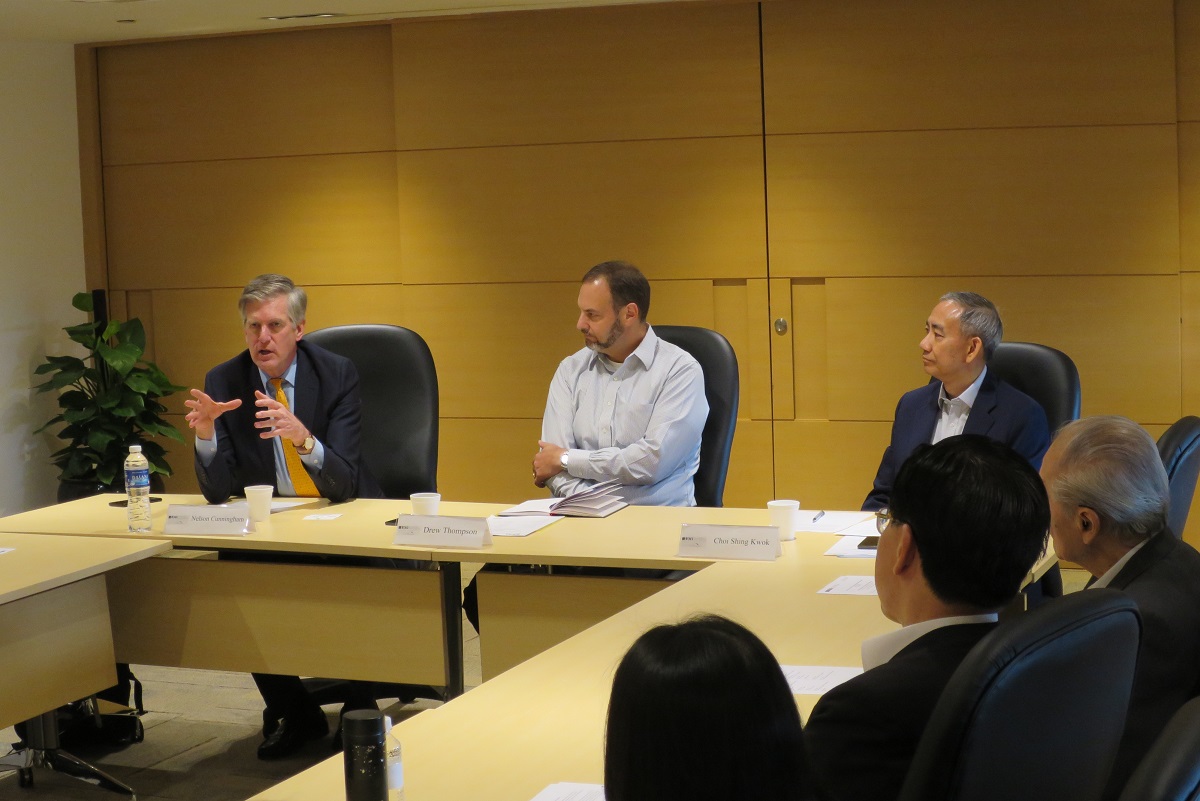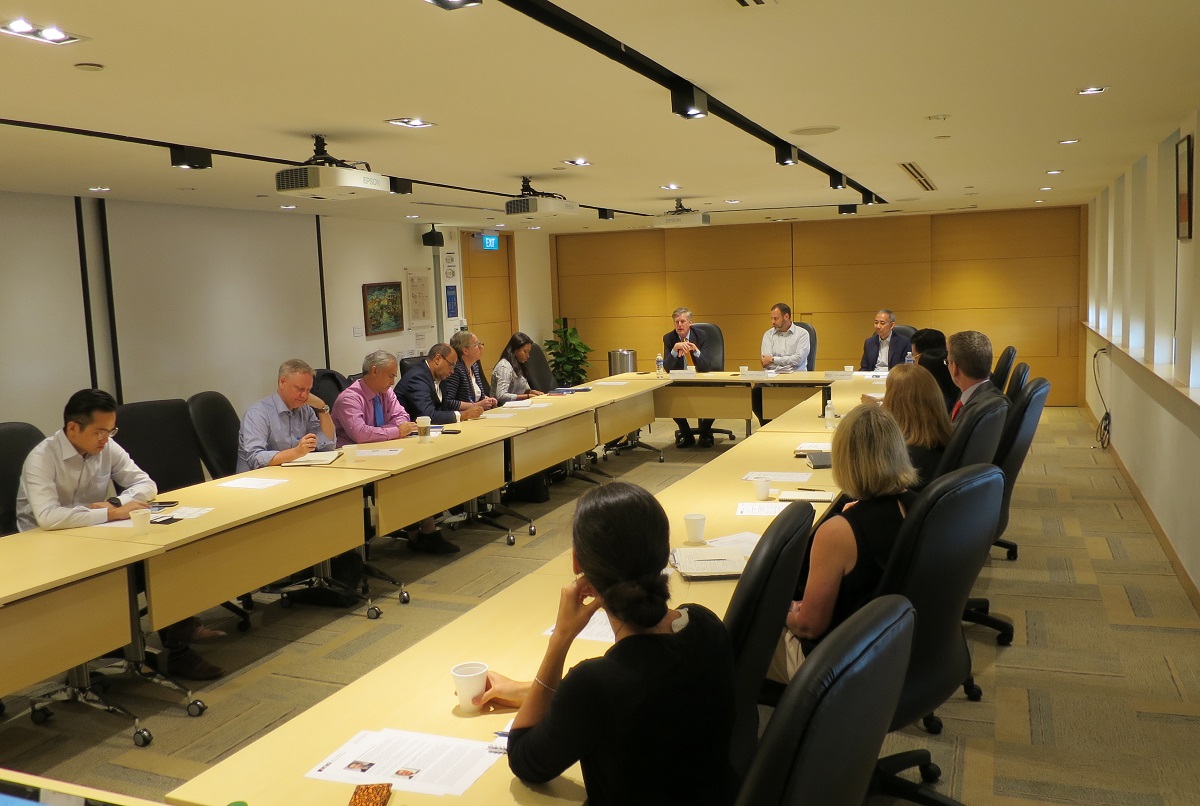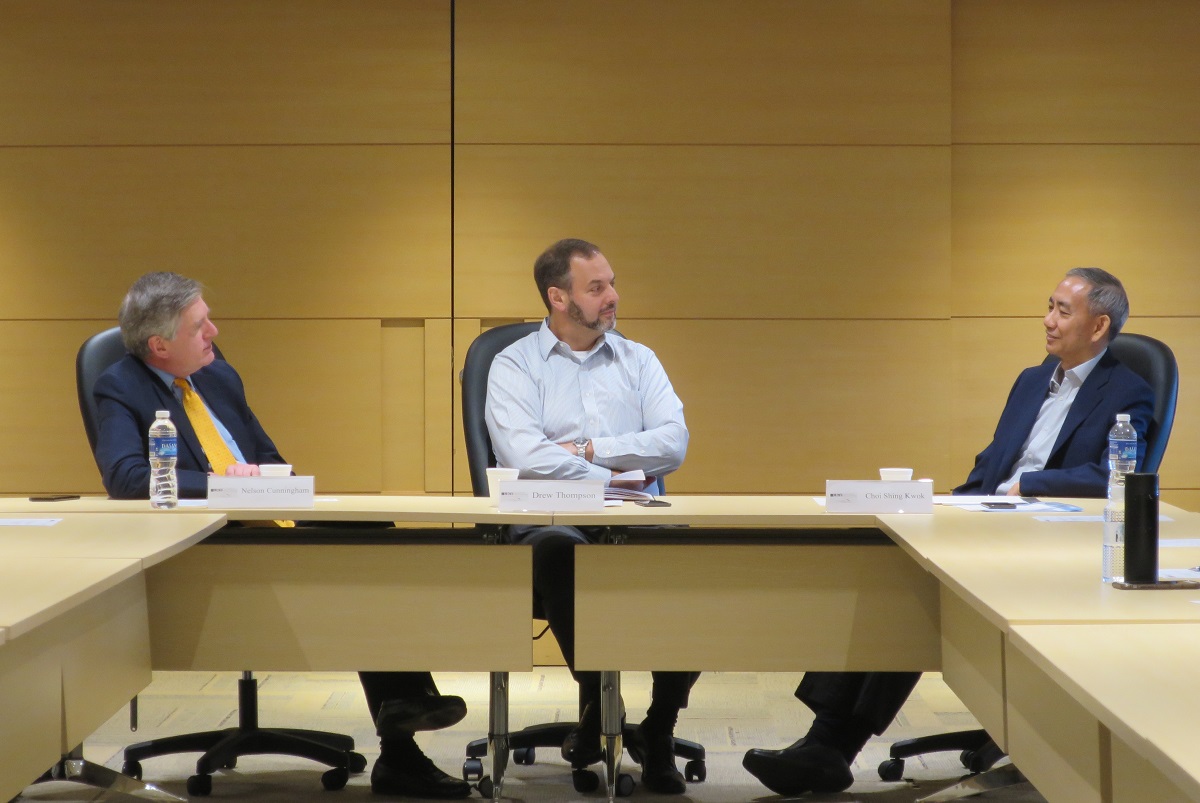
On March 19, 2019, the Centre on Asia and Globalisation (CAG) hosted a closed-door roundtable with Nelson Cunningham, President and co-founder of McLarty Associates, and Choi Shing Kwok, Director of the ISEAS-Yusof Ishak Institute. Drew Thompson moderated the discussion with guests that included representatives from government, industry and academia. The speakers provided their perspectives of the Trump Administration’s foreign policy, and how it is perceived in China and Southeast Asia (SEA), followed by a moderated discussion with the roundtable participants.
Nelson Cunningham asserted that both Washington and Beijing are increasingly concerned about the state of bilateral relations. Business communities in both countries are similarly concerned over the ongoing trade war and the souring of political ties. Until five years ago, the U.S. business community was generally supportive of a cordial relationship with China, and were an important bridge for communication between the two sides. More recently however, there have been growing concerns over China’s systemic violation of American intellectual property (IP) rights, forced technology transfer, as well as rising global competition from Chinese companies that have benefitted from State support and policies that have disadvantaged American companies. As far back as Trump’s first bid for President in 1987, he publicly railed against trade deficits, making it less surprising that he would willingly enter a trade war against China in an effort to address the concerns of the U.S. business community and inequality in the bilateral relationship.
The business community, Congress and policy hawks in the government all calling for substantial Chinese concessions makes it difficult for Trump to compromise or unilaterally declare victory in the trade war. In China, Xi Jinping also faces political pressure to achieve a substantial victory against the U.S. Before committing to a summit in the U.S., Xi will potentially seek at a minimum, a new trade agreement that accommodates China’s objective of protecting the State sector, and the release of Huawei’s Chief Financial Officer, Meng Wanzhou. While the Chinese see the arrest of Meng as politically motivated, the U.S. criminal justice system likely pursued her arrest without consideration for the politics or timing. Regardless, Trump made the arrest a political issue when he tweeted soon afterwards that a deal might be brokered with the release of Meng as a condition for a trade deal. While negotiations are still ongoing, Beijing may strategize to hold out and not make concessions to secure a long-term trade deal, opting instead to stabilize the current status quo and wait to see if Trump gets re-elected in 2020.
It is very possible that Joe Biden may run for the 2020 presidential election. It is likely that both Sherrod Brown and Michael Bloomberg dropped out of the race once they calculated that Biden would run. Their support bases are at opposite ends of the Democratic spectrum, but each felt Biden would erode their support. This shows the breadth of Biden’s support, from left to center-left. Notably, of the current Democrat candidates, Biden is the only one with foreign policy experience.
Choi Shing Kwok made three main points; firstly, he argued that Trump was not a cause, but an outcome of significant global political trends. In 2009, global public trust towards businesses plummeted following the financial crisis. The failure of governments to quickly resolve the crisis also led public opinion to turn against political elites beginning around 2011. This led people to become open to new and unconventional alternatives in their politics, explaining the rise of atypical and socialist politicians such as Jeremy Corbyn and Bernie Sanders, as well as support for populist movements such as Brexit.
Secondly, the dynamics between China and U.S. are fluid and disconcerting. Given the trajectory of the Chinese economy, it is only a matter of time before it overtakes the U.S. This, coupled with increasing political polarization in the U.S. has led China to view its own political system as superior to the West. Despite being widely viewed as autocratic, the Chinese government has a higher approval rating from its own people than that of the U.S. government from its own citizens. Trump’s unique approach to negotiating and diplomacy has made it difficult to predict U.S. goals and strategies vis-à-vis China. This makes the future of the bilateral relationship uncertain and worrying.
A recent study from ISEAS shows that Southeast Asia’s confidence in the U.S. is currently low. Member and non-member states are optimistic about the upcoming Comprehensive and Progressive Agreement for Trans-Pacific Partnership (CPTPP), regardless of whether the U.S. will eventually rejoin the agreement. While some states in SEA have become closer to China, all are wary of the Asian giant which is seen by many to be a revisionist power. Even countries that have grown economically dependent on China are cautious of Beijing, reflected in the regional pushback against Belt and Road Initiative (BRI) projects. Southeast Asian countries are therefore generally welcoming of other external powers being more active in the region. Countries in Southeast Asia are watching the developments between China and the U.S. closely and are adjusting to the ever-changing circumstances while striving to remain neutral in the rivalry between the two superpowers.

Drew Thompson moderated the discussion with roundtable participants, exploring Southeast Asian perceptions and assessments of the impacts of both tensions and opportunities arising from ups and downs in the U.S.-China relationship. China’s economic and political influence is on the rise and many states consider it necessary to be on amiable terms with Beijing, even while pursuing economic and security cooperation with the U.S. While trust in the U.S. has been declining, many states still see its presence in the region as a positive factor due to the long-term stability and security it has brought. Caught between two giants, most states in the region have been hesitant to fully commit to either camp, instead adopting a “watch and wait” strategy. Overwhelmingly, there is a strong preference for both superpowers to get along, so that regional states need not pick sides.
The region has also benefited from the ongoing trade war, which has accelerated the trend of foreign companies expanding or shifting manufacturing facilities out of China and into other low-cost production countries in the region like Vietnam. However, it is unlikely that manufacturers will completely vacate from China given the huge Chinese market and the need to maintain production facilities close to a major consumer base.
Technological competition between China and the U.S. is also heating up. While China currently trails the U.S., Southeast Asian countries assess that it will catch up given the enormous resources it is committing to dominate most high-tech fields. Technology and networks are already bifurcating as part of this competition, with China banning U.S. platforms, such as WhatsApp and Facebook while promoting the development of domestic ones, such as WeChat. Western companies may be obligated to use Chinese systems within China, but they are unlikely to do so elsewhere, given the possibility of compromise. This has already fostered the emergence of two separate global systems of business standards which will likely cause future challenges for global businesses.
The ongoing U.S.-China trade war reinforces concerns about bifurcation, particularly as its end is increasingly uncertain. Trump has come to realize that getting a clear win over China will not be easy. His aim now is most likely to determine how to obtain enough concessions to claim victory and satisfy the U.S. business community (and his own advisors and political supporters). Xi likewise faces his own domestic pressures. He cannot be perceived to have given in to Trump, or to have compromised China’s sovereignty or the Party’s role overseeing all aspects of society.
While Trump has demonstrated a penchant for transactional approaches to foreign policy, it is unlikely Trump would agree to Taiwan being part of any grand bargain with China. Drew Thompson observed that the Trump administration is the most supportive of Taiwan since the Eisenhower administration. Moreover, it is highly doubtful any transaction would be worth sacrificing the world’s 22nd largest economy, and America’s 11th largest trade partner. Importantly, a history of enforcement problems has made U.S. interlocutors highly suspicious of China and do not trust it to uphold its own end of any bargain, much less a grand one.
With domestic pressure from the Mueller investigation increasing over the next few months, it is possible Trump will become distracted from international issues, and turn inward. However, another possibility may be that the President may seek to score political points in foreign policy to distract domestic audiences from issues at home. This may encourage him to find some sort of positive win with China. But even if he achieves this, whatever concessions he obtains from China will not be evaluated objectively and will instead be viewed through a partisan lens.
This event summary was prepared by Byron Chong and Xu Shengwei from the Centre on Asia and Globalisation.
